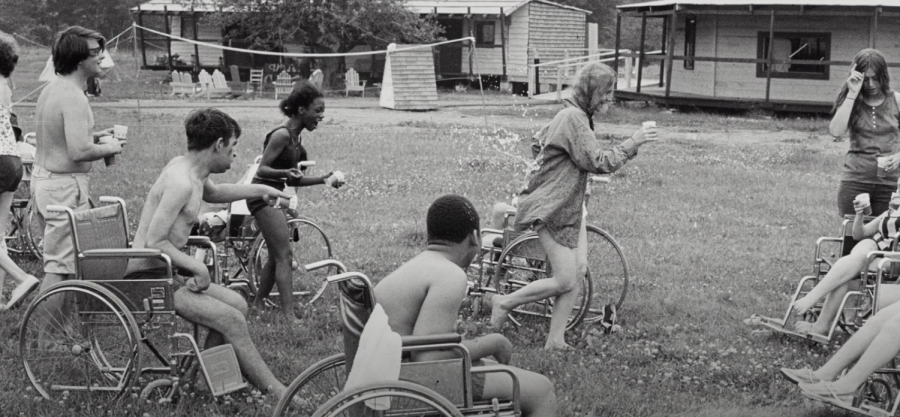This year has been a struggle for most of us between the ongoing pandemic to the Black Lives Matter movement to the toxic political climate. It is also very reminiscent of another time in recent history when there was a good deal of civil unrest in our nation.
At the beginning of this year I was notified that my brother, Stephen Hofmann, was one of several featured participants in a documentary film, “Crip Camp,” directed and produced by James LeBrecht and Nicole Newnham. Former President and First Lady Barack and Michelle Obama saw the value of this piece of work and executively produced the film with their production company, Higher Ground, making the lifelong dream of former camper LeBrecht a reality. The film premiered at the Sundance Film Festival in January and has been available to stream on Netflix since March.
Camp Jened was a camp established in 1951 at the foot of Hunter Mountain in the Catskill Mountain range in upstate New York for disabled young adults. By the time my brother Stephen, who had cerebral palsy, and his fellow campers arrived in the late 60’s and early 70’s, the counterculture was in full swing and the camp was now run by free-spirited and casual hippie counselors who were extremely liberal in their practices and procedures in running a camp of this nature. So while other hippies were enjoying Woodstock, my brother and his friends, known later as the ”Jenedians,” were sent to this camp less than two hours away. It was a camp that catered to disabled youth but it was the first time these campers felt the kind of freedom most of us take for granted. Out of this freedom they began to voice their wishes and desires and it sparked a revolution.
At this camp, a film crew had been taping conversations the campers had with the counselors and each other about what they missed out on by being disabled and how they felt about being viewed as “different.” In one particular clip you see Judith Heumann leading a group of other campers to make their own meal one night, saying it was the cooks’ night off and for them to take a vote on what they would cook themselves that evening.
This may have been the prompt that led her to later become the trailblazer behind Section 504 of the Rehabilitation Act of 1973, a civil rights movement for people with disabilities. Section 504 is a civil rights law that prohibits discrimination against individuals with disabilities. The Jenedians, led by Heumann, enlisted hundreds of people both able-bodied and disabled to crusade in the public arena. There were sit-ins, hunger strikes, marches and finally, legislation. It would have been a herculean feat by anyone, let alone a woman with polio who lived her life in a wheelchair, but it didn’t stop her then and she continues to work for social justice now.
Camp Jened may have been thought of as a little summer break for the parents who had to care for these youngsters, but the reality was that it was divine intervention that allowed for this to transpire in order for these youngsters to find their voice. Being in community together helped them forge relationships and bonds that would last a lifetime and it helped to light the match of passion and desire and fight for their rights as fellow human beings.
Sadly, my brother did not live long enough to see the fruits of his labor in this film as he passed away in 2017, but his whole family got together at the premiere in New York in February and we all celebrated this film by passing out buttons with his photo on it. He would have gotten such a kick out of being a celebrity. He will always be a celebrity in our eyes. Although I was too young during the time of Camp Jened and the fight for Section 504 to really understand or appreciate what was transpiring at the time, this film has given my family and I an incredible legacy to carry including for his two children, Shannon and Emily. Emily even appeared in the film at the bittersweet end and spoke so eloquently about her dad. Stephen used to say, as he would climb down into the subway, that all he needed was one person to help him with his wheelchair and that would be enough to get him anywhere. Thanks to Heumann and all of the Jenedians, no one has to climb down, they can take an elevator and be independent, which is really all they ever wanted, just like all of us.
During this time where there is an increased focus on diversity and inclusion, I recommend “Crip Camp” as a must-see. It shows how one small voice can inspire and illuminate an entire group of people to come together and show enormous strength and resilience. My eternal gratitude to James LeBrecht for never giving up on this project.









John Benjamin David Tatum • Nov 4, 2021 at 3:10 am
I was just thinking of Stephen, I was a friend of his and drove out to UIUC from Ohio to help him out (in a NASTY snowstorm) back around 2000. Was missing him and was just “googling” him and came across this article.
This is the first time I heard of him passing in 2017.
Thinking of the memories of our having Gyro sandwiches together over cups of Peet’s Coffee sweetened with Brown Sugar.
I have had a rough year, I was the only survivor of a house fire on 18-December-2020 (a week to the day before Christmas). So I guess as the one year anniversary of the fire is coming up, Stephen came up in my thoughts.
If you would like to reach me:
John Tatum
27 West Second Street
Apartment 312
Mansfield, OH 44902-1931
Email: [email protected]
It was good to catch the documentary officially posted by Netflix on YouTube, and see Stephen back when I was about 3 years of age (I was born on 22-July-1968).
It was heartwarming seeing him then. In his C.W. Post days.
I offer my most sincere condolences and prayers for your entire family (this Sunday my local Parish is having a Berevement Mass, and I am going for those I lost last December and I will remember Stephen and all of you at the Mass).
Thank you,
John
Rhonda Heschel • Aug 12, 2021 at 10:51 pm
Dear Patty, Shannon and Emily,
I just watched Crip Camp and it was truly a moving and important documentary. I’m so sorry that your brother/father didn’t live to see it but thank you for writing this piece so I could reach out to you and let you know what an impact the film had on me. I wish I could meet every person featured in the film to let them know that their story is important and that they are seen. I’m starting a fellowship that trains us in disability activism. This was the best first assignment I could imagine.
Best wishes,
Rhonda
Bronwyn Rucker • Apr 7, 2021 at 11:03 am
The best documentary I have ever seen. Congratulations!
Thomas Hofmann • Oct 14, 2020 at 7:36 pm
Great job sis!, can’t wait to watch it again!
Karyn • Oct 14, 2020 at 7:03 pm
I agree with Ms. Hofmann that this is a must see documentary. If you want to be inspired and lifted up,especially in these times dealing with social injustice, watch it with a new hope that things can change if you have the will and determination.
I would like to add, Jim & Nicole did a great job using humor to show such humanity in the everyday lives of these special people
Jean Nolan • Oct 14, 2020 at 6:56 pm
This is a beautiful piece on many levels, the message closely parallels the events of today and is also another beautiful way to honor the memory of your brother. Well done Patty Hofmann! Well done!